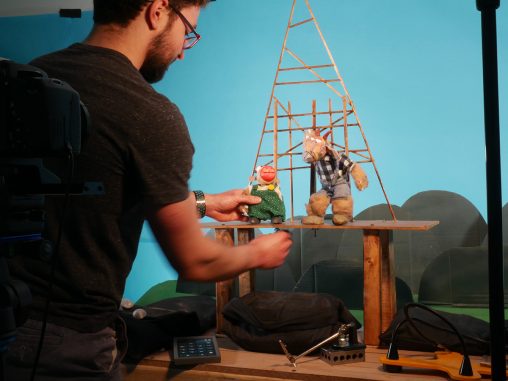
Ben Young’s animated film “Gooey Goats” was one of 12 films by Wright State students that were screened at the Big Lens Film Festival in April at the Dixie Twin Drive-In.
Wright State University’s Motion Pictures Program found innovative ways to engage students during Spring Semester, providing access to a number of successful film and television professionals.
The Motion Picture Production Program (MoPix) welcomed 16 working professionals from the film and television industry during the semester. This is the highest number of guests who have participated in motion pictures program activities in one semester.
Eight guests participated in the program’s first extracurricular Professional Development Salon series, in which students learned about launching and maintaining a career in the film and television industry. The series was created and moderated by Nichol Simmons, adjunct motion pictures faculty member.
“The ’20–’21 school year brought multiple challenges to all of us across campus, but MoPix faculty and staff are proud of how we innovated in our classrooms and in the way our students rose to the occasion and continued to create outstanding documentary and narrative work under unprecedented circumstances,” said Simmons, who graduated from Wright State in 1999 with a bachelor’s degree in motion pictures production. “However, we’re all looking forward to returning to our classrooms in the fall!”
Salon guests included Carole Kirschner, who wrote “Hollywood Game Plan” and launched the Mentorship Matters program to place writers of color inside writers’ rooms; Kim Adelman, author of “Making It Big in Shorts”; and entertainment attorney Jonathan Gray.
The series also gave students the opportunity to collaborate with faculty members from the Wright State College of Science and Mathematics and the Raj Soin College of Business.
“Wright State’s Motion Picture Production Program, and the film industry at large, truly touch all the elements that are foundational to STEAM programs — science, technology, engineering, the arts and math — so we see tremendous opportunities for future collaborations across campus,” Simmons said.
Tara Hill, associate professor of human services, gave a presentation on creativity, including self-care and about how cognitive behavioral therapy can help creators start or finish projects.
“As freelancers, we often work in very high-stress environments,” Simmons said. “Self-care is a critical part of my curriculum and I was thrilled that Dr. Hill could join us.”
Bill Wood, coordinator of the Financial Services Degree Program, provided insights from his personal finance course to help students understand financial areas they should plan for as they launch their careers.
“Bill Wood was important to our professional development discussion because the film and TV industries are largely freelance, and often non-union, so, therefore, have sporadic paychecks and few retirement benefits,” Simmons said.
Jeremy Bolden, an instructor in the Motion Pictures Program, welcomed several guest speakers in his Intermediate Production and Senior Seminar courses. Students received advice from the speakers about techniques, equipment, and areas to consider for further training, study, and specialization when they enter the workforce after graduation.
Guests in production classes included motion graphic designer and 1995 Wright State alumna Paula Kinsel, who has worked on projects for Marvel, Disney and Dreamworks; screenwriter Jake Morgan; student Emmy-winner, writer and director Erica Chan; and Emmy-winning documentarian and 1995 Wright State graduate Adam White.
The Motion Pictures Program concluded the Spring Semester with the Big Lens Film Festival, which featured short films, documentaries, animated films and music videos from 2020 and 2021 Wright State graduates. This year’s festival was held at the Dixie Twin Drive-In.
For the first time, the films were selected by a jury, which included Ryan Levin, vice president of Levin Services; Sherman Payne, a screenwriter and Wright State alumnus; Lisa Grigsby, executive director of Film Dayton; Jesseca Ynez Simmons, founder of the Dayton Independent Film Festival; and Chris Tung, Wright State alumnus and production finance executive at Netflix.

 Wright State’s Homecoming Week features block party-inspired events Feb. 4–7 on the Dayton Campus
Wright State’s Homecoming Week features block party-inspired events Feb. 4–7 on the Dayton Campus  Wright State music professor honored with Ohio’s top music education service award
Wright State music professor honored with Ohio’s top music education service award  Wright State’s Industrial and Human Factors Engineering program named one of top online graduate programs by U.S. News
Wright State’s Industrial and Human Factors Engineering program named one of top online graduate programs by U.S. News  Student-run ReyRey Café celebrates decade of entrepreneurship at Wright State
Student-run ReyRey Café celebrates decade of entrepreneurship at Wright State  Wright State faculty member Damaris Serrano wins Panamanian literary award
Wright State faculty member Damaris Serrano wins Panamanian literary award 